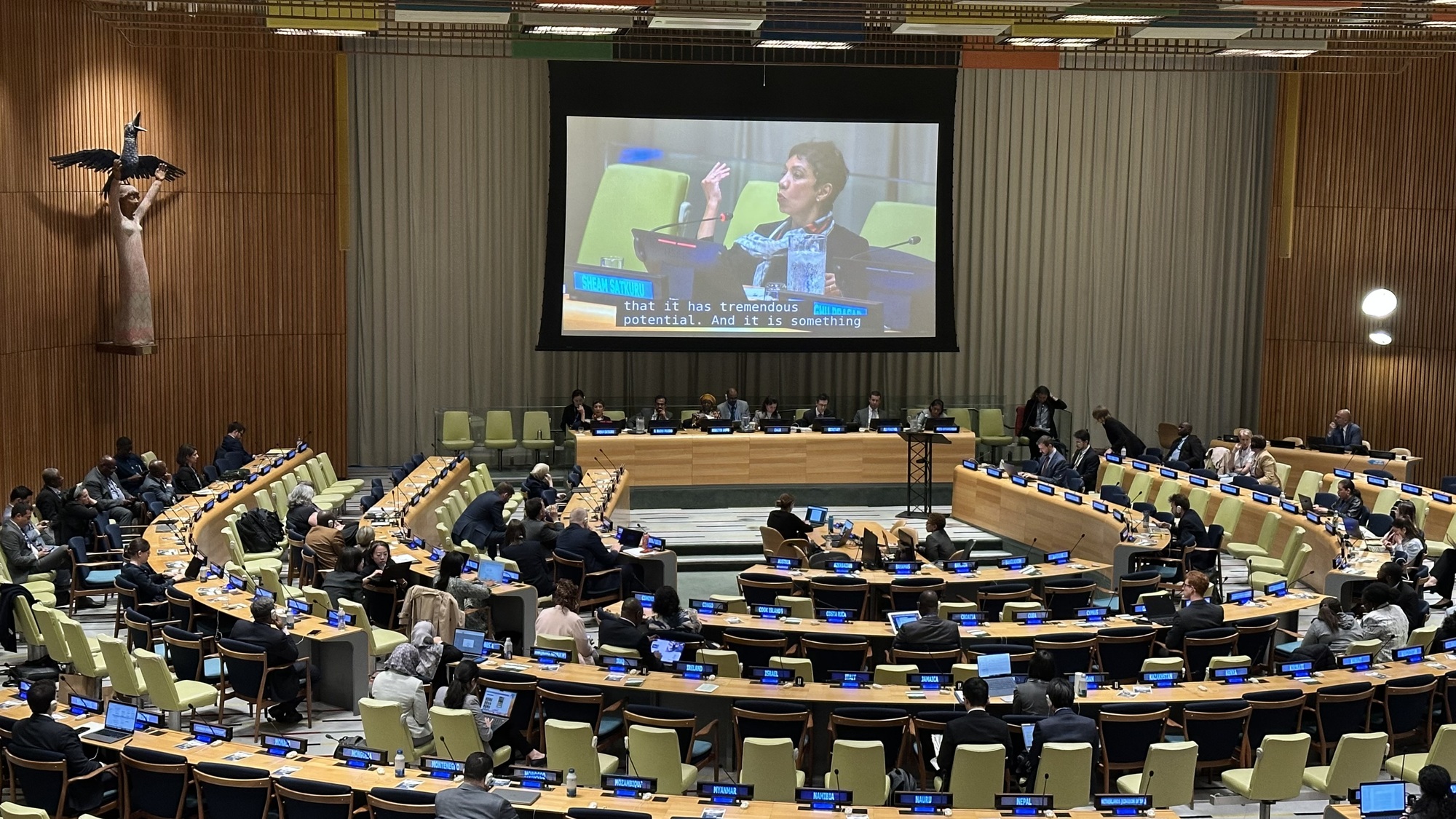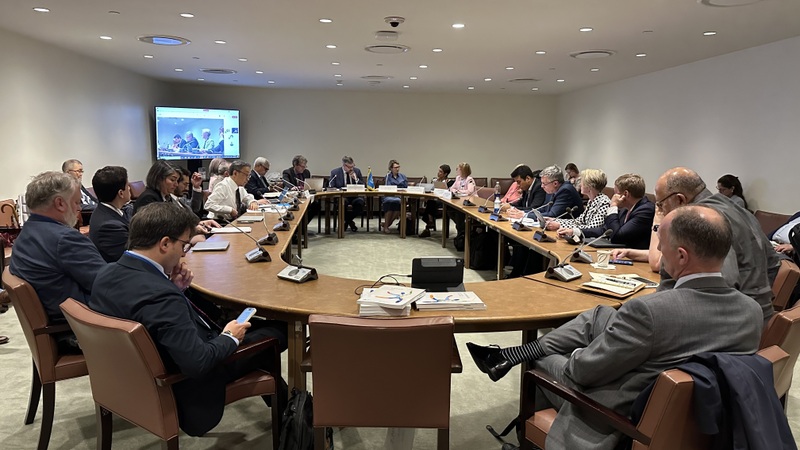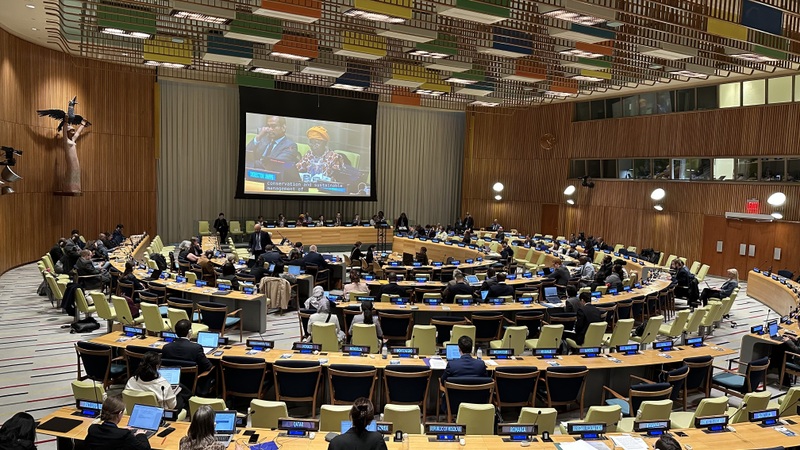ITTO at UNFF20: Leverage public-private synergies to increase the value of tropical forest services
07 May 2025, New York

ITTO Executive Director Sheam Satkuru emphasized that forests provide vital services beyond timber—such as climate regulation and livelihood support—and warned that failing to reflect these in national budgets risks undervaluing essential natural resources. Photo: Ramon Carillo/ITTO
As part of the weeklong gathering in New York, on 06 May 2025 the International Tropical Timber Organization (ITTO) actively contributed to critical discussions centered on advancing the Global Forest Goals and UN Strategic Plan for Forests 2017–2030 at the 20th session of the United Nations Forum on Forests (UNFF20).
Pushing for public-private sector collaboration
ITTO participated in the side event “Unlocking the Potential: Public-private Sector Collaboration for Advancing Global Forest Goals”, co-hosted by the Advisory Committee on Sustainable Forest-based Industries (ACSFI) and the International Council of Forest and Paper Associations (ICFPA). This event highlighted the forest sector’s vital role in transitioning toward net-zero, nature-positive economies and the unique position of the forest-based private sector to support the achievement of the global environmental goals.
Ms Satkuru’s contribution under the theme Leveraging Synergies: Public-private Sector Collaboration focused on the critical role of the Collaborative Partnership on Forests (CPF), a voluntary alliance of 16 international organizations with forest-related programmes, in building collaborative and results-oriented partnerships for sustainable forest management and also the ITTO’s role in public-private sector initiatives. She emphasized the importance of learning from each other’s experiences and building on collective knowledge to maximize benefits for countries and forest-dependent communities. She also stressed the necessity of inclusive multi-stakeholder engagement, which no doubt must include Indigenous Peoples, local communities and smallholders.
“The private sector is not just a stakeholder; it is a driver of innovation, investment, and accountability. To meet our forest goals, the public sector needs to ensure that the rules are clear, fair and implementable, the support is sustained, and the incentives are aligned for businesses of all sizes to thrive while protecting our forests,” she said.

Highlighting ITTO’s relevant work, she emphasized ITTO’s dual mandate - diversifying trade in tropical timber and non-timber forest products from sustainably managed and legally harvested forests. She referred to the ITTO’s Legal and Sustainable Supply Chains (LSSC) Programme and the Global Legal and Sustainable Timber Forum (GLSTF) as key platforms for engaging both public and private sectors. These initiatives foster collaboration among timber industry stakeholders to embrace legal and sustainable supply chains, strengthen international cooperation, and support inclusive circular bioeconomies. Through data analysis, market transparency, and trade monitoring, ITTO supports member countries’ access to reliable information and builds stable, responsible markets.
Ms Satkuru reflected on the challenges CPF faces in advocating for sustainable forest management in global climate discussions, where forests’ roles are increasingly acknowledged but not always fully reflected in policy frameworks. She reaffirmed the importance of persistent and unified advocacy, particularly in international climate and biodiversity negotiations.
She further reiterated the vital role of the private sector in the transition to a circular bioeconomy. She stressed the need for clear, stable regulatory frameworks that enable the private sector to invest, innovate, and deliver long-term sustainability outcomes. “A circular bioeconomy is no longer a vision—it is a necessity. The private sector must be equipped and be empowered to lead the charge, and that starts with building trust, transparency, and opportunity,” she added.
Valuing forest ecosystem services
On the same day, a dedicated panel at UNFF20 focused on the economic valuation of forest ecosystem services and the need for systemic change in integrating these values into national policymaking frameworks. Studies have shown that land degradation alone costs countries an average of 9% of their GDP. Yet, forest ecosystem services remain largely invisible in traditional accounting systems, leading to policy decisions that may inadvertently drive deforestation and degradation. Achieving Global Forest Goal 2—enhancing forest-based economic, social and environmental benefits—requires acknowledging the true value of forests.

ITTO Executive Director Sheam Satkuru presented under the theme Promoting Nature’s True Economic Value, where she emphasized the importance of piloting approaches to Payment for Ecosystem Services (PES), evidenced in ITTO projects. “Forests provide far more than timber—they regulate our climate, protect our water, and support livelihoods,” she said. “If we cannot see these benefits in our budgets and national accounts, we risk undervaluing the very resources we depend on”, she said.
She highlighted the need for site-specific assessments based on forest type, harmonized standards, and the use of clear criteria and indicators. She further stressed the importance of cross-sectoral coordination and addressing fundamental issues such as land tenure in designing PES schemes that work for both communities and investors.
Interventions from the delegations of Latvia, Mexico, UK, Finland, Japan, Malaysia, Canada, Brazil, New Zealand, and China followed, signalling broad international support for valuing ecosystem services and aligning economic policies with conservation goals. Ms Satkuru’s intervention reinforced ITTO’s leadership in linking the benefits of tropical forestry with economic sustainability and effective policy frameworks.
Moving forward
From highlighting the value of ecosystem services to fostering public-private collaboration, ITTO underscored the urgent need for integrated, equity-driven approaches to forest management that align environmental integrity with economic viability. With its dual mandate and on-the-ground experience, ITTO remains committed to supporting its member countries in achieving the Global Forest Goals and ensuring forests continue to deliver vital benefits for people, nature, and climate.
-----------------------------------
Catch up on ITTO's participation during the first day of UNFF20 here. Stay tuned for our next article highlighting ITTO’s engagement at the event.